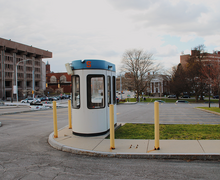Hacker: Obama’s plan to lower cost of higher education serves as catalyst for long-term reform, potential congressional action
Last week, President Obama spoke at Henninger High School in Syracuse. He outlined a new executive initiative to lower the cost of higher education.
His plan is a step in the right direction. But it is too small a step. It is unlikely the initiative will cause any significant change in the prohibitively high cost of a college degree.
Obama’s plan may prove a solid stepping-stone to a more comprehensive, long-term strategy. But for now, the President should provide a more complete outline of his plan to reduce the cost of a college degree.
The president’s plan is to introduce a new rating system for colleges through an administrative order.
The new system gives colleges a rating that takes into account the number of scholarships offered, tuition and related costs, and whether the college admits a significant amount of economically disadvantaged students.
Obama hopes the rating system can be a comprehensive guide for high school students applying to college. The plan will also function as a means to increase competition between schools to improve their value propositions. After all, higher education in America is a business. Schools with poor ratings will be forced to change their policies to meet the standards of the rating system in order to remain competitive in the marketplace.
A possible objection to the proposal is that the rating system requires private colleges to adhere to government-dictated policies, thwarting the public-private divide. Private universities by nature determine and dictate their own goals and ideals. The proposal limits them to government-determined specifics.
But in situations where a business is taking advantage of the consumer, government intervention is necessary and warranted. In a time when college degrees are essential for professional success but their cost is prohibitively high, something has to be done. It is perfectly acceptable for the government to intervene.
The problem, though, is that this “something” is not enough. “US News & World Report” ranks do not force colleges to undergo serious change. Syracuse University is a perfect example.
Our “US News & World Report” rating has been steadily declining in recent years but SU Chancellor Nancy Cantor is dismissive of the rating system, sticking to her original vision for the direction of the university.
Chancellor Cantor said she believes Syracuse would score well on Obama’s rating system. This is hypocrisy. If SU did score well, then it would undermine the whole proposal – the cost of tuition at SU has been rising at a rate of more than 3.6 percent each year for the past 46 years.
President Obama’s plan is simply a minor change in the economic landscape of higher education. The issue of higher education and its related costs are deeper than anything a simple plan like Obama’s could begin to fix.
The issue has to be addressed first and foremost by colleges themselves, not by a minimalistic government program. Colleges must take a hard look at how they allocate resources to programs, salaries for university officials, their role (if any) in improving their local economies and the ratio of merit-based scholarships to athletic scholarships they award incoming students.
If President Obama is serious about intervening in the seller-buyer relationship that is higher education in America, he should propose a price-cap on tuition. His system rates colleges relative to other colleges. If tuition continues to rise across the board, the rating system will prove useless and ineffective. A price-cap is obviously a hypothetical that would never pass, but it illustrates the fact that if the government is going to get involved, drastic measures must be taken.
The issue of lowering higher education costs is one of the few issues that can be solved regardless of partisanship. In this sense, there is hope that something of substance will get done. Politicians from both parties agree we need to make college more affordable. But they disagree on the methods to reach their goals.
If anything, Obama’s efforts will prove a catalyst for long-term comprehensive reform and congressional action.
Michael Hacker is a senior political science major. His column appears weekly. He can be reached at mahacker@syr.edu and followed on Twitter at @mikeincuse.
Published on August 29, 2013 at 2:52 am





